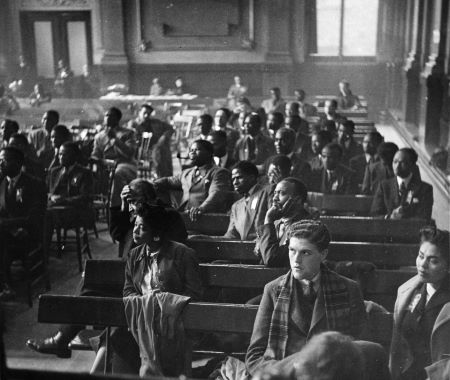THE FIFTH Pan-African Congress, which took place in October 1945, was a milestone in the struggle of African nations for independence from their former colonial masters.
The decisions made at this conference—which took place in Manchester’s Chorlton-on-Medlock Town Hall—played a key role in events in the 1950s and 60s which saw many of Africa’s former colonies claim the right to rule themselves.
Given it was conducted just a few months after the Second World War ended, the 1945 Congress is regarded as being the most important of the seven Pan-African Congress meetings that were held overall. Even though the war had been fought in the name of freedom, hundreds of millions of people in Africa still lived in colonies controlled by Britain, France, Holland, and other European nations.

Several influential thinkers and independence campaigners who would later go on to play significant roles in both the American civil rights movement and numerous African independence movements attended the Manchester event.
Among them was Kwame Nkrumah, who later became President of independent Ghana, the future President of Kenya Jomo Kenyatta, and the celebrated African American academic W. E. B. Du Bois.
Now, a unique set of images published by Getty Images has shed light on what happened during this momentous event.

Earlier this year, the company launched its Black History & Culture Collection (BHCC), an initiative created to provide free non-commercial access to historical and cultural images of the African/Black Diaspora in the US and UK from the 19th century to the present day. The collection aims to grant access to rarely seen images for educators, academics, researchers, and content creators, enabling them to tell untold stories about Black culture.

Getty Images has partnered with a number of organisations and educational institutions, including Black History Walks and Ohio State University and Black Archives in the United States, who have already used the collection as part of educational curriculum, exhibitions, and dialogues surrounding vital events from the past, from well-known to previously unseen or untold events.

“Getty Images visual archive can provide a unique look into the past and bring untold stories to the present,” said Ken Mainardis, Senior Vice President of Content at Getty Images. “With the launch of the Black History & Culture Collection, we are proud to be able to unearth and open up access to content previously unavailable or hard to find, facilitating the better telling and understanding of Black history through our visual content.”
During the Congress flags of the then three independent African nations, the Republics of Liberia, Haiti, Ethiopia were draped on the walls of Chorlton-on-Medlock Medlock Town Hall.

The week of the conference (October 14 to October 22), saw numerous discussions and resolutions, many of which called for the criminalization of racial discrimination. Delegates shared accounts of the fight for independence taking place in their nations in an age before rapid access to live news.
The photos of the Pan African Congress were originally taken for the now defunct Picture Post magazine, a photojournalistic magazine published in the UK from 1938 to 1957.
The magazine’s historic collection of photos is now part of the Getty archive.

Leading University of Pennsylvania academic Dr. Tukufu Zuberi said: “This archive is an invitation for those who have not seen themselves clearly represented to see other imagery, to see others, and to empathize with them as a way of including and enhancing the narratives they can tell and stories they can include.
“Everything is not there, however there is sufficient material to begin a process of reordering how we tell stories, why we tell stories, and the availability of new content representing Black bodies, representing Black spaces, representing Black history across waters, doing it in a way that shows that even Black people have been part of our history.”


Comments Form
1 Comment
The 1945 Pan Africanist Conference in Manchester England, empowered Africans to believe they could lead their colonial African Subjects to political independents from Western Caucasian Colonial powers.
The great African-heritage thinkers of the era were attracted to the 1945 conference; and helped when political independence occurred in the 1960s.
We do not enjoy a gathering of African-heritage people today; genuinely involved in finding African solutions to the may troubles continental Africa’s is enduring today.